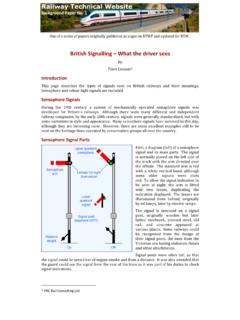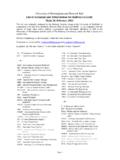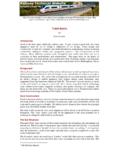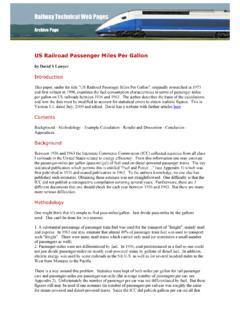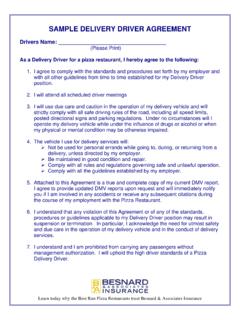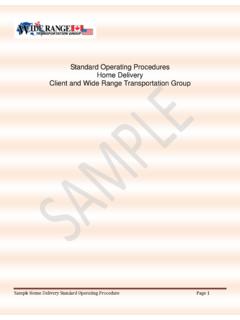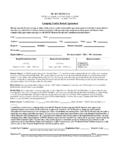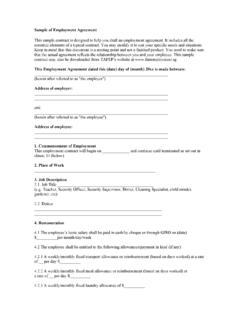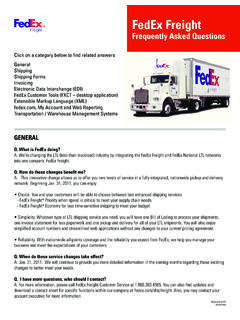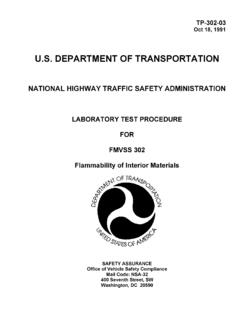Transcription of University of Birmingham and Network Rail - …
1 Rail Lexicon Mark 24, February 2011 Page 1 of 60 University of Birmingham and Network Rail Railway Lexicon Mk 24, February 2011 This lexicon was originally produced by the Railway Systems Group at the University of Sheffield, in co-operation with staff from Railtrack, Network Rail, Bechtel, HMRI and RAIB and with the support from a number of other organisations and individuals. Members of staff at the University of Birmingham and the team of The Railway Consultancy update the Rail Lexicon on a regular basis. Obsolete Railtrack terminology is shown in brackets, where known to be no longer in use. Comments and feedback are welcomed by: and In general, the UK term railway is used rather than the US term railroad . - A - Abnormal Heavy Road Load any road load which falls outside the scope of the Construction and Use Regu-lations because of its weight or weight distribution. Abnormal Road Load Indemnity a form of indemnity submitted to Network Rail by a road haulier as prescribed in the Motor Vehicles (Authorisation of Special Types) General Order 1979 (as amended).
2 Abnormal Road Load Notification a notice submitted to Network Rail by a haulier which gives loading details of a proposed abnormal road load movement, its proposed date and time of travel, and its proposed route. Absolute Block a railway signalling system which is based on the principle of dividing a railway line into a sequence of individual sections or blocks, allied to the principle of never having more than one train on the same line in the same section at the same time. The acceptance of a train by the signaller at the signal box in advance is necessary before a train is allowed to proceed into the Absolute Block Section. Abstract of Particulars a subsection of the contract conditions which contains routine details relevant to that specific contract. Acceptable Quality Level a value which limits the number of contract checks which are permitted to fail within a predetermined sample ( an AQL of indicates that no more than of the checks will be permitted to produce a fail without a tightening of the inspection regime.)
3 Acceptance (of rolling stock) final part of the process to introduce new types of rolling stock, on-board systems or infrastructure components to the railway Network managed by Network Rail. Acceptance Manager the Network Rail manager assigned by the RSAB Group Manager, having responsibility for managing the process for a route acceptance request. The Acceptance Manager will be the Network Rail principal point of contact on non-commercial matters to the applicant. Acceptance Plan a Network Rail project plan defining Network Rail activities in support of a Route Acceptance Request. Accepting UK railway signalling term, 'accepting' refers to the permission given by a signaller for a train to enter the section of line which he or she controls. Access Agreement an agreement regulated under the Railways Act 1993 setting out the terms and conditions under which companies/operators obtain access to railway track, stations and certain types of depots.
4 Access Charge the charge paid by railway operators for access to rail facilities which are the subject of an access agreement. Access Planning Software access planning software system for the planning of track access for both permanent and short-term train schedules. It replaced PROTIM. Accident an unexpected, unplanned occurrence which results in physical harm (injury or disease) to an individual, damage to property, a near miss, a loss, or any combination of these effects. An unwanted or unintended Rail Lexicon Mark 24, February 2011 Page 2 of 60 sudden event or a specific chain of events which have harmful consequence (taken from European Railway Safety Directive 2004) (See also Incident) +RAIB Accommodation Bridge a bridge connecting two areas of land which were under common ownership but separated when the railway was built. Accommodation Crossing as for accommodation bridge, but by using a foot crossing over the railway rather than a bridge.
5 Account Executive the manager responsible for commercial dealings with the Train Operators. Accounts Payable a team of people within the finance function responsible for the correct payment of authorised supplier invoices. Account Receivable a team of people within finance responsible for the dispatch and credit control of properly authorised invoices to customers. Activity Based Costing the process of identifying the costs associated with particular day-to-day activities or specific tasks and projects. Actual Costs the term used to encompass both costs paid over to suppliers and accruals. Actual Cost of Work Performed an assessment of the physical progress on a scheme and its financial value. This will include costs for invoices paid and accruals to repeat bills not yet presented for the actual progress achieved. Add Value Machines used in some automatic fare collection systems to allow passengers to increase the residual value of a stored value ticket.
6 Adhesion Coefficient ( ) the ratio of the tangential and normal forces that exist between the wheel and the rail at standstill and during motion. The adhesion coefficient for rolling motion is usually referred to as R. Generally taken as to for dry rail, but can be as low as for icy and greasy rail. Adjacent Line a line or siding next to the line you are on (Rule Book definition) Adjustment Switch a device which allows longitudinal rail movement to dissipate thermal forces when CWR is adjacent to jointed track or other features not designed to withstand thermal forces. Adjustment switches are also used when thermal forces, additional to those in CWR, may be encountered such as at long underbridges which are themselves subject to expansion and contraction. (US term: Breather Switch.) Advanced Passenger Train high speed tilting train, abandoned in the early 1980s. Air Rights Development property exceeding existing building height constructed on and above land owned by Network Rail.
7 Airless Spraying the process of atomisation of paint by forcing it hydraulically through an orifice at high pressure Alignment the horizontal (line) and vertical (top) position of a railway track, described by curved track of horizontal radius R, tangent track where R= , vertical radius and gradient. Alley (US) slang word for a track in a switching (marshalling) yard. (UK: marshalling yard.) Anchor Length the length of CWR track that is left clipped down during the stressing operation to ensure that no movement occurs at the fixed ends of the length being stressed. Ancillary Movement movements of locomotives and rolling stock directly in association with normal day-to-day train services. Annual Renewal Plan plan identifying those assets which were to be renewed by Railtrack in the forthcoming contract Anti-Creeper (US) a device firmly attached to the base of a rail and bearing against a crosstie (sleeper), to keep the rail from moving longitudinally under traffic.
8 (UK: Rail Anchor.) Approved In Principle approval in principle signifies that a professionally competent person or body has seen appropriate evidence and is satisfied that: A scheme chosen to bring about a change to the infrastructure will meet the requirements of the remit; appropriate standards and/or design criteria have been proposed for the design/checking phase. Area Delivery Group a zonal team charged with meeting the minutes delay targets by identifying, testing and implementing performance improvements. Rail Lexicon Mark 24, February 2011 Page 3 of 60 Arm Repeater an electrical indicator which shows the position of a semaphore signal arm to the controlling signalman. Articulation the core feature of a rolling stock design where two adjacent railway vehicle ends are mounted on a common bogie. Nowadays much favoured by tramcar or light rail vehicle (LRV) designers. Also used for some European high-speed train designs, namely, TGV and Eurostar carriages.
9 It has the benefit of reducing the number of bogies required for a train. Generally only suitable for lighter weight vehicles since the load on each axle is proportionately increased. Usually requires that special lifting systems or bogie drop-pits are provided in maintenance workshops. Aspect the visual indication of a colour light (or mechanical) signal as displayed to the driver. Asset Maintenance Plan a plan of remedial maintenance work outstanding from the BR maintenance programme prior to creation of Railtrack. Asset Maintenance Plan Provision the funding provision provided to Railtrack on company formation to complete the works identified in the AMP. Asset Management Work Team the team which led a detailed review of Railtrack s approach to asset manage-ment with the key objective of optimising maintenance and renewal costs. Asset Related Expenditure any expenditure relating to the enhancement or renewal and, for certain asset categories, maintenance of the railway infrastructure and any other assets as per the Capital Accounting Rules.
10 This will include expenditure relating to Capital Enhancement and Renewal Projects, Asset Maintenance Plan and Station Regeneration Programme. Refer to the Railtrack Investment Regulations, Capital Accounting Rules and SRP Financial Guidelines for further information. Asset Renewal replacement by Network Rail of an existing asset whose maintenance is within the scope of the RT1A contract. Asset Replacement renewal of an asset undertaken by the contractor at no additional cost to the employer. Assisted Despatch a procedure on LUL whereby staff are provided to assist the driver in checking that no person or article is trapped in the doors prior to despatch. This is done when the driver is unable to do this for themselves due to defective equipment or the train stopped in the wrong place. Associated Society of Locomotive Engineers and Firemen union which represents many train drivers. Authority to Recruit the approval, by a person with delegated authority, for the recruitment of permanent or agency staff.
